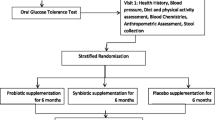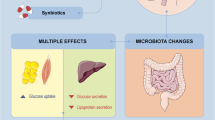Abstract
Objectives
Pro-, pre-, and synbiotic supplements improve cardiovascular risk factors. However, the association between nonfood pro-, pre-, and synbiotics (NPPS) and long-term all-cause and cardiovascular mortality has not been studied. Thus, our objective was to determine the impact of nonfood pro-, pre-, and synbiotics on all-cause and cardiovascular mortality.
Design, Setting, and Participants
This was a retrospective, cohort study of 4837 nationally representative American participants aged 65 years or older with a median follow-up duration of 77 months.
Measurements
All-cause and cardiovascular mortality were measured.
Results
A total of 1556 participants died during the median 77-month follow-up, and 517 died from cardiovascular disease. Compared with participants without NPPS use, participants who used NPPS experienced a reduced risk of all-cause mortality by nearly 41% (hazard ratio 0.59, 95% CI 0.43 to 0.79) and cardiovascular mortality by 52% (HR 0.48, 95% CI 0.30 to 0.76). Such an effect persisted in most subgroup analyses and complete-case analyses.
Conclusion and Relevance
In this study, we found a protective effect of NPPS against all-cause and cardiovascular mortality in Americans aged 65 years or older. Nonfood pro-, pre-, and synbiotics can be a novel, inexpensive, low-risk treatment addition for all-cause and cardiovascular mortality for older individuals.




Similar content being viewed by others
Data Availability Statement
Publicly available datasets were used in this study. These can be found in NHANES at https://www.cdc.gov/nchs/nhanes/index.htm.
References
Virani SS, Alonso A, Benjamin EJ, et al. Heart Disease and Stroke Statistics-2020 Update: A Report From the American Heart Association. Circulation. 2020;141(9):e139–e596.https://doi.org/10.1161/cir.0000000000000757
Roth GA, Mensah GA, Johnson CO, et al. Global Burden of Cardiovascular Diseases and Risk Factors, 1990–2019: Update From the GBD 2019 Study. J Am Coll Cardiol. 2020;76(25):2982–3021.https://doi.org/10.1016/j.jacc.2020.11.010
Sommer F, Bäckhed F. The gut microbiota—masters of host development and physiology. Nat Rev Microbiol. 2013;11(4):227–38.https://doi.org/10.1038/nrmicro2974
Nicholson JK, Holmes E, Kinross J, et al. Host-gut microbiota metabolic interactions. Science. 2012;336(6086):1262–7.https://doi.org/10.1126/science.1223813
Parker A, Romano S, Ansorge R, et al. Fecal microbiota transfer between young and aged mice reverses hallmarks of the aging gut, eye, and brain. Microbiome. 2022;10(1):68.https://doi.org/10.1186/s40168-022-01243-w
Ho J, Nicolucci AC, Virtanen H, et al. Effect of Prebiotic on Microbiota, Intestinal Permeability, and Glycemic Control in Children With Type 1 Diabetes. J Clin Endocrinol Metab. 2019;104(10):4427–40.https://doi.org/10.1210/jc.2019-00481
Chen PB, Black AS, Sobel AL, et al. Directed remodeling of the mouse gut microbiome inhibits the development of atherosclerosis. Nat Biotechnol. 2020;38(11):1288–97.https://doi.org/10.1038/s41587-020-0549-5
Hill C, Guarner F, Reid G, et al. Expert consensus document. The International Scientific Association for Probiotics and Prebiotics consensus statement on the scope and appropriate use of the term probiotic. Nat Rev Gastroenterol Hepatol. 2014;11(8):506–14.https://doi.org/10.1038/nrgastro.2014.66
Salminen S, Collado MC, Endo A, et al. The International Scientific Association of Probiotics and Prebiotics (ISAPP) consensus statement on the definition and scope of postbiotics. Nat Rev Gastroenterol Hepatol. 2021;18(9):649–67.https://doi.org/10.1038/s41575-021-00440-6
Swanson KS, Gibson GR, Hutkins R, et al. The International Scientific Association for Probiotics and Prebiotics (ISAPP) consensus statement on the definition and scope of synbiotics. Nat Rev Gastroenterol Hepatol. 2020;17(11):687–701.https://doi.org/10.1038/s41575-020-0344-2
Bernini LJ, Simao AN, Alfieri DF, et al. Beneficial effects of Bifidobacterium lactis on lipid profile and cytokines in patients with metabolic syndrome: A randomized trial. Effects of probiotics on metabolic syndrome. Nutrition. 2016;32(6):716–9.https://doi.org/10.1016/j.nut.2015.11.001
Soleimani A, Zarrati Mojarrad M, Bahmani F, et al. Probiotic supplementation in diabetic hemodialysis patients has beneficial metabolic effects. Kidney Int. 2017;91(2):435–42.https://doi.org/10.1016/j.kint.2016.09.040
Garcia-Carrizo F, Galmes S, Pico C, Palou A, Rodriguez AM. Supplementation with the Prebiotic High-Esterified Pectin Improves Blood Pressure and Cardiovascular Risk Biomarker Profile, Counteracting Metabolic Malprogramming. J Agric Food Chem. 2022;70(41):13200–11.https://doi.org/10.1021/acs.jafc.2c03143
Armani RG, Carvalho AB, Ramos CI, et al. Effect of fructooligosaccharide on endothelial function in CKD patients: a randomized controlled trial. Nephrol Dial Transplant. 2021;37(1):85–91.https://doi.org/10.1093/ndt/gfaa335
Esmaeilinezhad Z, Barati-Boldaji R, Brett NR, et al. The effect of synbiotics pomegranate juice on cardiovascular risk factors in PCOS patients: a randomized, triple-blinded, controlled trial. J Endocrinol Invest. 2020;43(4):539–48.https://doi.org/10.1007/s40618-019-01139-x
Cicero AFG, Fogacci F, Bove M, Giovannini M, Borghi C. Impact of a short-term synbiotic supplementation on metabolic syndrome and systemic inflammation in elderly patients: a randomized placebo-controlled clinical trial. Eur J Nutr. 2021;60(2):655–63.https://doi.org/10.1007/s00394-020-02271-8
Szulinska M, Loniewski I, Skrypnik K, et al. Multispecies Probiotic Supplementation Favorably Affects Vascular Function and Reduces Arterial Stiffness in Obese Postmenopausal Women-A 12-Week Placebo-Controlled and Randomized Clinical Study. Nutrients. 2018;10(11).https://doi.org/10.3390/nu10111672
Koppinger MP, Lopez-Pier MA, Skaria R, Harris PR, Konhilas JP. Lactobacillus reuteri attenuates cardiac injury without lowering cholesterol in low-density lipoprotein receptor-deficient mice fed standard chow. Am J Physiol Heart Circ Physiol. 2020;319(1):H32–H41.https://doi.org/10.1152/ajpheart.00569.2019
Lin P, Gui X, Liang Z, Wang T. Association of Yogurt and Dietary Supplements Containing Probiotic Consumption With All-Cause and Cause-Specific Mortality in US Adults: A Population-Based Cohort Study. Front Nutr. 2022;9:803076.https://doi.org/10.3389/fnut.2022.803076
O’Connor LE, Gahche JJ, Herrick KA, Davis CD, Potischman N, Vargas AJ. Nonfood Prebiotic, Probiotic, and Synbiotic Use Has Increased in US Adults and Children From 1999 to 2018. Gastroenterology. 2021;161(2):476–86e3.https://doi.org/10.1053/j.gastro.2021.04.037
Johnson CL, Paulose-Ram R, Ogden CL, et al. National health and nutrition examination survey: analytic guidelines, 1999–2010. Vital Health Stat 2. 2013(161):1–24.
Shivappa N, Steck SE, Hurley TG, Hussey JR, Hebert JR. Designing and developing a literature-derived, population-based dietary inflammatory index. Public Health Nutr. 2014;17(8):1689–96.https://doi.org/10.1017/S1368980013002115
Park YM, Choi MK, Lee SS, et al. Dietary inflammatory potential and risk of mortality in metabolically healthy and unhealthy phenotypes among overweight and obese adults. Clin Nutr. 2019;38(2):682–8.https://doi.org/10.1016/j.clnu.2018.04.002
Yuan S, Song C, Zhang R, He J, Dou K. Dietary Inflammation Index and Its Association with Long-Term All-Cause and Cardiovascular Mortality in the General US Population by Baseline Glycemic Status. Nutrients. 2022;14(13).https://doi.org/10.3390/nu14132556
Institute. NC. The Healthy Eating Index–Population Ratio Method. Updated December 14, 2021. [Available from: https://epi.grants.cancer.gov/hei/population-ratio-method.html.
Rong S, Li B, Chen L, et al. Association of Low-Density Lipoprotein Cholesterol Levels with More than 20-Year Risk of Cardiovascular and All-Cause Mortality in the General Population. J Am Heart Assoc. 2022;11(15):e023690.https://doi.org/10.1161/jaha.121.023690
Levey AS, Stevens LA, Schmid CH, et al. A new equation to estimate glomerular filtration rate. Ann Intern Med. 2009;150(9):604–12.https://doi.org/10.7326/0003-4819-150-9-200905050-00006
Pontes K, Guedes MR, Cunha MRD, et al. Effects of probiotics on body adiposity and cardiovascular risk markers in individuals with overweight and obesity: A systematic review and meta-analysis of randomized controlled trials. Clin Nutr. 2021;40(8):4915–31.https://doi.org/10.1016/j.clnu.2021.06.023
Ivey KL, Hodgson JM, Kerr DA, Thompson PL, Stojceski B, Prince RL. The effect of yoghurt and its probiotics on blood pressure and serum lipid profile; a randomised controlled trial. Nutr Metab Cardiovasc Dis. 2015;25(1):46–51.https://doi.org/10.1016/j.numecd.2014.07.012
Liberale L, Badimon L, Montecucco F, Lüscher TF, Libby P, Camici GG. Inflammation, Aging, and Cardiovascular Disease: JACC Review Topic of the Week. J Am Coll Cardiol. 2022;79(8):837–47.https://doi.org/10.1016/j.jacc.2021.12.017
Canani RB, Costanzo MD, Leone L, Pedata M, Meli R, Calignano A. Potential beneficial effects of butyrate in intestinal and extraintestinal diseases. World J Gastroenterol. 2011;17(12):1519–28.https://doi.org/10.3748/wjg.v17.i12.1519
Duncan BB, Schmidt MI, Pankow JS, et al. Low-grade systemic inflammation and the development of type 2 diabetes: the atherosclerosis risk in communities study. Diabetes. 2003;52(7):1799–805.https://doi.org/10.2337/diabetes.52.7.1799
Gomes JMG, Costa JA, Alfenas RCG. Metabolic endotoxemia and diabetes mellitus: A systematic review. Metabolism. 2017;68:133–44.https://doi.org/10.1016/j.metabol.2016.12.009
Shiels MS, Katki HA, Freedman ND, et al. Cigarette smoking and variations in systemic immune and inflammation markers. J Natl Cancer Inst. 2014;106(11).https://doi.org/10.1093/jnci/dju294
Allais L, Kerckhof FM, Verschuere S, et al. Chronic cigarette smoke exposure induces microbial and inflammatory shifts and mucin changes in the murine gut. Environ Microbiol. 2016;18(5):1352–63.https://doi.org/10.1111/1462-2920.12934
Cui X, Jin Y, Singh UP, et al. Suppression of DNA damage in human peripheral blood lymphocytes by a juice concentrate: a randomized, double-blind, placebo-controlled trial. Mol Nutr Food Res. 2012;56(4):666–70.https://doi.org/10.1002/mnfr.201100496
Shivappa N, Steck SE, Hussey JR, Ma Y, Hebert JR. Inflammatory potential of diet and all-cause, cardiovascular, and cancer mortality in National Health and Nutrition Examination Survey III Study. Eur J Nutr. 2017;56(2):683–92.https://doi.org/10.1007/s00394-015-1112-x
Akbaraly T, Sabia S, Hagger-Johnson G, et al. Does overall diet in midlife predict future aging phenotypes? A cohort study. Am J Med. 2013;126(5):411–9.e3.https://doi.org/10.1016/j.amjmed.2012.10.028
Martin FP, Wang Y, Sprenger N, et al. Probiotic modulation of symbiotic gut microbial-host metabolic interactions in a humanized microbiome mouse model. Mol Syst Biol. 2008;4:157.https://doi.org/10.1038/msb4100190
Yang Q, Zhang Z, Gregg EW, Flanders WD, Merritt R, Hu FB. Added sugar intake and cardiovascular diseases mortality among US adults. JAMA Intern Med. 2014;174(4):516–24.https://doi.org/10.1001/jamainternmed.2013.13563
Miglioranza Scavuzzi B, Miglioranza LH, Henrique FC, et al. The role of probiotics on each component of the metabolic syndrome and other cardiovascular risks. Expert Opin Ther Targets. 2015;19(8):1127–38.https://doi.org/10.1517/14728222.2015.1028361
Pan Y, Jing J, Cai X, et al. Prevalence and Vascular Distribution of Multiterritorial Atherosclerosis Among Community-Dwelling Adults in Southeast China. JAMA Netw Open. 2022;5(6):e2218307.https://doi.org/10.1001/jamanetworkopen.2022.18307
Xu C, Liang J, Xu S, Liu Q, Xu J, Gu A. Increased serum levels of aldehydes are associated with cardiovascular disease and cardiovascular risk factors in adults. J Hazard Mater. 2020;400:123134.https://doi.org/10.1016/j.jhazmat.2020.123134
Moon S, Yu SH, Lee CB, Park YJ, Yoo HJ, Kim DS. Effects of bisphenol A on cardiovascular disease: An epidemiological study using National Health and Nutrition Examination Survey 2003–2016 and meta-analysis. Sci Total Environ. 2021;763:142941.https://doi.org/10.1016/j.scitotenv.2020.142941
Park SK, Sack C, Sirén MJ, Hu H. Environmental Cadmium and Mortality from Influenza and Pneumonia in U.S. Adults. Environ Health Perspect. 2020;128(12):127004.https://doi.org/10.1289/ehp7598
Acknowledgement
The authors thank the participants and staff of the National Health and Nutrition Examination Survey 2007–2016 for their valuable contributions.
Funding
This study is funded by the Zhejiang Traditional Chinese Medicine Research Fund Project (2022ZB405) for covering publication fees.
Author information
Authors and Affiliations
Contributions
R.S. contributed to the study design, data analysis, and manuscript drafting. S.C. (co-first author) contributed to the study design and data analysis. W.L. contributed to manuscript drafting. J.S. contributed to interpretation of the data. T.W. and L.L. contributed to the study design and critical revision. All authors have read and approved the final manuscript.
Corresponding authors
Ethics declarations
The National Center for Health Statistics (NCHS) Ethics Review Board approved the NHANES program. Written informed consent was obtained for participation in this study.
Additional information
Conflict of interest disclosure form
he authors declare that they have no known competing fiscal interests or personal relationships perceived to have influenced the work reported in this article.
Electronic supplementary material
Rights and permissions
About this article
Cite this article
Shen, R., Chen, S., Lei, W. et al. Nonfood Probiotic, Prebiotic, and Synbiotic Use Reduces All-Cause and Cardiovascular Mortality Risk in Older Adults: A Population-Based Cohort Study. J Nutr Health Aging 27, 391–397 (2023). https://doi.org/10.1007/s12603-023-1921-1
Received:
Accepted:
Published:
Issue Date:
DOI: https://doi.org/10.1007/s12603-023-1921-1




